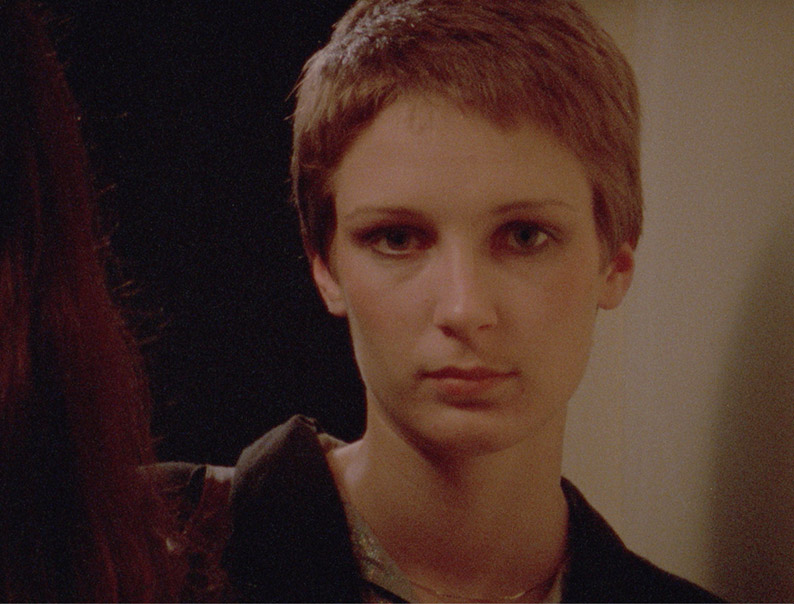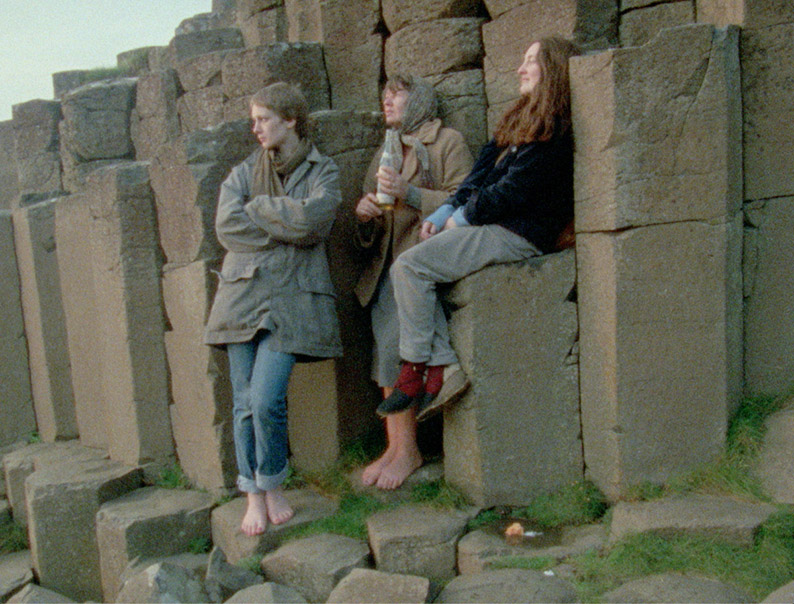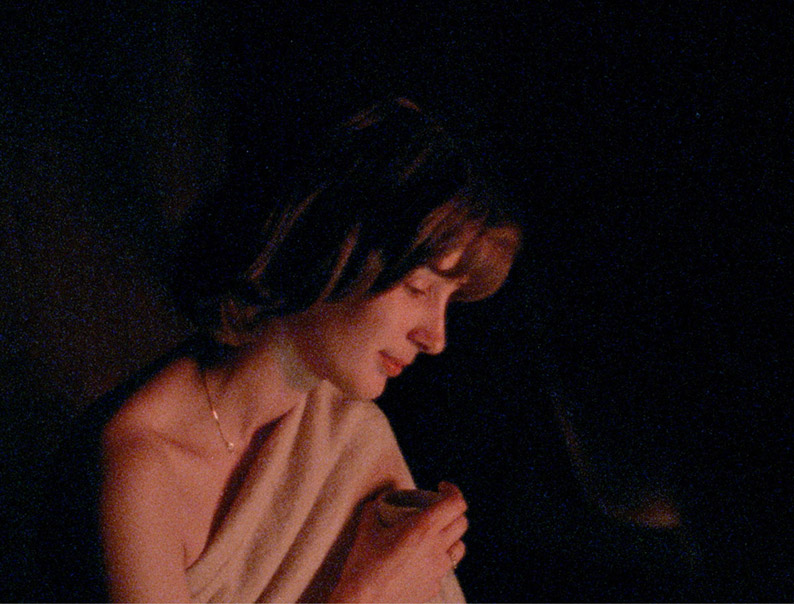| “Woman is a nationality I carry around with me.” |
Maeve Sweeney (Mary Jackson) grew up in Belfast but left there and lives in London. She returns to visit her family, who are Catholics: her parents (Mark Mulholland and Trudy Kelly) and her younger sister Roisin (Brid Brennan). Her return uncovers tensions in her family, with her ex Liam (John Keegan) and in the community, as Maeve’s ideas of her place in the society are not shared by others.
Ireland has made its own films for many decades, though as have many a smaller country adjacent to a much larger one, it has often struggled to establish an identity of its own – compare, for example, Belgium and France, or New Zealand and Australia. Needless to say, there has been a lot of overlap between Irish cinema and that of the UK, and of course the country’s landscapes have been used in overseas productions. Irish-American filmmakers such as John Ford helped mythologise their old country, and those images of Ireland have tended to persist, such as those Ford showed us in The Quiet Man, to name but one.
Over the years, some Irish directors became prominent, which resulted in them working internationally on higher budgets: Neil Jordan and Jim Sheridan, for example. On the other hand, there have always been films made on much smaller budgets and independently. One such was Bob Quinn’s Poitín, made in 1978 with funding from the Arts Council of Ireland, with dialogue entirely in the Irish language, a first in both respects. Inevitably, such groups of filmmakers as were working in the country were male-dominated. One exception to that was Dublin-born Pat Murphy, who has directed three feature films: Maeve (1982), Anne Devlin (1984) and Nora (2002).

Maeve, shot in 16mm with funding from the British Film Institute and Radio-Telefis Éireann, announces itself upfront as a collective effort: it’s “a film by” Murphy, John Davies and Robert Smith, and they, rather than a production company, are the copyright holders. Murphy wrote the script, Smith was the cinematographer, Davies edited and Murphy and Davies co-directed. While no doubt Maeve is a product of teamwork like any other feature films, it’s hard to avoid Murphy’s contribution weighing the heaviest. Murphy, born in 1951, had studied film and television under feminist theorist Laura Mulvey, and Jean-Luc Godard and Bertholt Brecht were avowed influences. So the aim is not so much a drama that we are absorbed in – though Maeve holds the attention throughout, and did on a second viewing too – but a place for dialectic and discussion, often with political ends, here overtly feminist ones. At times, a character might look directly into the camera as they talk, almost but not quite breaking the fourth wall. Part of the stimulus for the film was Murphy and Davies’s dissatisfaction with the idea that a documentary was necessarily the truth, as it could be manipulated as much as any fiction, so by making a film which was fiction they could perhaps reach for a greater truth. There’s only diegetic music, with no score, another possible way of manipulating the material that the filmmakers have avoided.
Much of the film plays out as discussion between Maeve and Roisin, Liam and others. One difference between this and Murphy’s two later films is that her other protagonists were real people (Anne Devlin was a nineteenth-century Irish republican while Nora centres on Nora Barnacle, James Joyce’s partner) but Maeve is a fictional character. Some of her experiences are autobiographical on Murphy’s part, not least her leaving Belfast for London, as Maeve has done. As a woman in Northern Ireland, her concerns are ignored and trivialised by the men around her: she has no place in their narrative.
Maeve asks how a woman can, in Murphy’s words, “position herself against the background of what was going on in the North and within the history of of republicanism and memory and landscape”. That landscape features from the start, as the plane on which Maeve arrives in Belfast flies over a stone circle, one which she sees every time she makes this journey. And at the end, Maeve, Roisin and their mother are on the Giant’s Causeway, the three of them held in the same frame as they listen to a man rant to an audience of the Atlantic Ocean. Memory also plays a part as the film slips fluidly from present to unspecified past times again without much in the way of signposting. I counted five timelines and, as a clue, Maeve’s hair is generally longer the younger she is. (Nuala McCann plays Maeve as a child.)

Visually, the film is quietly naturalistic, and the acting is what it should be, sometimes conveying more about Maeve, Roisin and the others than the script intentionally does. Outside this film, Mary Jackson’s most prominent roles were in two of Graham Reid’s Billy plays for Play for Today. Brid Brennan has had a more extensive stage and screen career which continues to this day. She and Murphy reunited when Brennan played the title role in Anne Devlin.
Maeve is released by the BFI in an all-regions Blu-ray. The film was given a AA certificate (fourteen and over) on its original cinema release and is now a 15.
Shot in 16mm, and originally released in that gauge, Maeve is presented on Blu-ray in its intended aspect ratio of 1.37:1, remastered in 2K resolution from the original negative and interpositive. The results are very pleasing. This isn’t the most colourful of films, and colours are generally muted. Some longer shots look softer, but that’s to be expected in a 16mm-originated film, and grain is natural and not too harsh.
The soundtrack is the original mono, rendered as LPCM 1.0 and is clear and well balanced. English hard-of-hearing subtitles are available.
Being a Woman is a Nationality: A Video Essay on Maeve (14:09)
This video essay is made up of extracts from the film, edited by Chris O’Neill, with a narration written by O’Neill and voiced by Claire Loy. It does a good job of elucidating the themes of the film, especially the feminist ones.
Irish Cinema – Ourselves Alone? (51:19)
Many countries made a documentary about its own cinema for the Century of Cinema project in 1995, and Irish Cinema - Ourselves Alone? was the Irish entry, directed by Donald Taylor Black and narrated by Gabriel Byrne. It takes us back to the very beginnings of cinema in Ireland: the Lumière Brothers’ actuality shot of O’Connell Street in Dublin in 1897, the first known motion picture footage shot in the country. We also see clips from the first feature film shot in the country, The Boy from Old Ireland (1910), directed by Sidney Olcott, who had left for the USA to work there as an actor. His feature film was technically American, and was unsurprisingly an emigration story, the result billed as the first film made on two continents. As with any documentary, we see clips of films taken out of the archive – from silent days to those more recent – that you just know you won’t easily get to see, unless someone puts them out on DVD or even Blu-ray, which will depend on rights and clearances and available materials. (Nowadays, you’d take streaming in the absence of anything else.) We do see some of the most famous Irish-American directors at work, not just Ford but also John Huston, making his final film in the country, his adaptation of James Joyce’s novella The Dead. Some younger Irish filmmakers are interview too, including Pat Murphy, Bob Quinn, Neil Jordan and Jim Sheridan as well as writers like Roddy Doyle. It’s good to have this available, with the inevitable proviso that it’s now a quarter-century old and a further generation of Irish filmmakers have emerged, such as Lenny Abrahamson, John Crowley and the McDonagh brothers. So an update would be interesting.

The BFI’s Booklet, available in the first pressing only, runs to thirty-two pages. As usual, watch the film before you read the essays here. Emmie McFadden begins with “Sites of Power – Memory, Storytelling and Identity”, covering the inspiration and the making of Maeve, which became the first feature film shot in Belfast. As McFadden points out, it’s the perspective which is different: a young woman at the centre of the film against a background familiar by then from news and documentaries: the army checkpoints, the bombed houses, the political divisions, the pressures from organised religion as well as from patriarchy. While Murphy was making Maeve, she also came to know American filmmaker Lizzie Borden, and Murphy has a small acting role in Borden’s Born in Flames (1983). Borden discusses the currents in feminist thought of the time, especially as seen in terms of women’s bodies. At one point, in a long conversation with her sister, Maeve is seen nude, but her body on screen is not objectified or eroticised. Jack O’Dwyer contributes an appreciation of Maeve, in a piece reprinted from Film Ireland.
Much of the booklet is taken up with a conversation between Murphy, Davies and Smith, which took place in March 2021 and what comes across is the sheer hard work involved in making the film, especially as Murphy and Davies had not made a feature film before. Also in the booklet are full film credits, notes on and credits for the extras, and stills.
Maeve is a significant film in Irish cinema and feminist cinema, and this new release enables it to be seen more widely. There are fewer extras than in other BFI releases, but those there are, are well chosen.
|